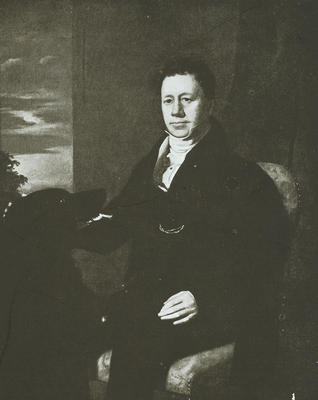
James Ewing of Strathleven (1775-1853), businessman, politician and Lord Provost.
Son of a prosperous West Indies merchant, Ewing went to the University of Glasgow when he was 12 years old. Following in his father's footsteps, he founded the firm of James Ewing & Co and amassed a fortune in trade with the West Indies. He was a strong supporter of free trade and contributed to the successful campaign for the ending of the East India Company's monopoly of trade to the Far East, as a result of which the first Glasgow ship reached Calcutta in 1816. In 1827 Ewing laid the foundation stone of the new Royal Exchange, as chairman of the committee of subscribers.
Ewing was elected Dean of Guild in 1816-1817 and again in 1831-1832; he was Lord Provost in 1832-1833 and for the same period he was MP for Glasgow, having topped the poll in the first post-Reform Act election. He played a major role in the foundation of the Glasgow Savings Bank and in the purchase of the ground for the Necropolis. For many years he lived in Crawford Mansion, with its famous rookery, which earned him the nickname "Craw Ewing". The mansion was situated at the head of Queen Street, on the site of what is now Queen Street Station.
Reference: Mitchell Library, GC 332.61 BEW
Reproduced with the permission of Glasgow City Council, Libraries Information and Learning
Keywords:
Crawford Mansion, Deans of Guild, East India Company, free trade, Glasgow Savings Bank, James Ewing & Co, Lord Provosts, Members of Parliament, MPs, Necropolis, Queen Street Station, rookeries, Royal Exchange, West Indies merchants
You have 0 images in your photo album.